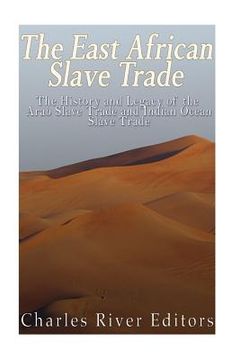The East African Slave Trade: The History and Legacy of the Arab Slave Trade and the Indian Ocean Slave Trade (en Inglés)
Reseña del libro "The East African Slave Trade: The History and Legacy of the Arab Slave Trade and the Indian Ocean Slave Trade (en Inglés)"
*Includes pictures *Includes contemporary accounts of the slave trade *Includes online resources and a bibliography for further reading "It is certain that large numbers of slaves were exported from eastern Africa; the best evidence for this is the magnitude of the Zanj revolt in Iraq in the 9th century, though not all of the slaves involved were Zanj. There is little evidence of what part of eastern Africa the Zanj came from, for the name is here evidently used in its general sense, rather than to designate the particular stretch of the coast, from about 3 N. to 5 S., to which the name was also applied." - Ghada Hashem Talhami "The Zanj Rebellion Reconsidered". The International Journal of African Historical Studies. 10 (3): 443-461. (1977). It has often been said that the greatest invention of all time was the sail, which facilitated the internationalization of the globe and thus ushered in the modern era. Columbus' contact with the New World, alongside European maritime contact with the Far East, transformed human history, and in particular the history of Africa. It was the sail that linked the continents of Africa, Asia, and Europe, and thus it was also the sail that facilitated the greatest involuntary human migration of all time. The Transatlantic Slave Trade was founded by the Portuguese in the 15th century for the specific purpose of supplying the New World colonies with African slave labor. It was soon joined by all the major trading powers of Europe, and it reached its peak in the 18th century with the founding and development of plantation economies that ran from the South American mainland through the Caribbean and into the southern states of the United States. Toward the end of the 18th century, it began to fall into decline, and by the beginning of the 19th century, various abolition movements heralded its eventual outlawing. It was, throughout its existence, however, a purely commercial phenomenon, supplying agricultural power to vast plantations on an industrial scale. In every respect, it was unaffected and uninfluenced by history, sentimentality, tradition, or common law. Slaves transported across the Atlantic Ocean remained a commodity with a codified value, like a horse or a steam engine, existing often within an equation of obsolescence and replacement that was cheaper than nurturing and maintenance. The East African Slave Trade on the other hand, or the Indian Ocean Slave Trade as it was also known, was a far more complex and nuanced phenomenon, far older, significantly more widespread, rooted in ancient traditions, and governed by rules very different to those in the western hemisphere. It is also often referred to as the Arab Slave Trade, although this, specifically, might perhaps be more accurately applied to the more ancient variant of organized African slavery, affecting North Africa, and undertaken prior to the advent of Islam and certainly prior to the spread of the institution south as far as the south/east African coast. It also involved the slavery of non-African races and was, therefore, more general in scope. The African slave trade is a complex and deeply divisive subject that has had a tendency to evolve according the political requirements of any given age, and is often touchable only with the correct distribution of culpability. It has for many years, therefore, been deemed singularly unpalatable to implicate Africans themselves in the perpetration of the institution, and only in recent years has the large-scale African involvement in both the Atlantic and Indian Ocean Slave Trades come to be an accepted fact. There can, however, be no doubt that even though large numbers of indigenous Africans were liable, it was European ingenuity and greed that fundamentally drove the industrialization of the Transatlantic slave trade in response to massive new market demands created by their equally ruthless exploitation of the Americas.

